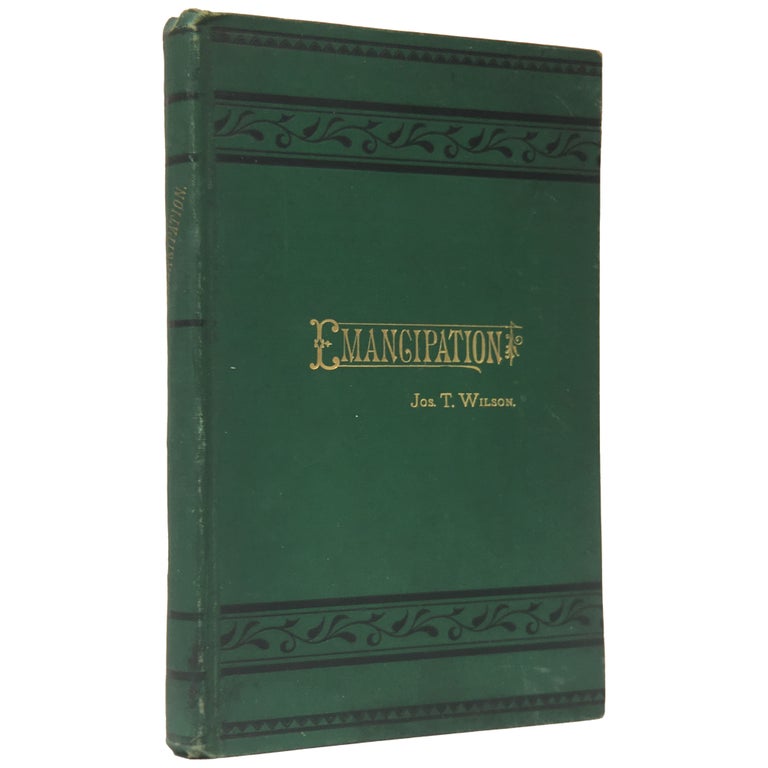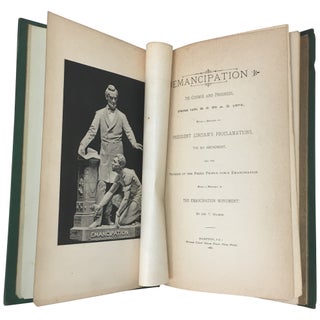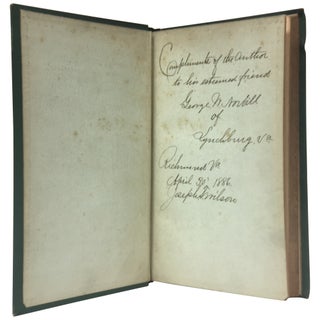A Free Black Writer on Emancipation Printed at a Black Press, Inscribed by the Author
Emancipation: Its Course and Progress, from 1481 B.C. to A.D. 1875, with a Review of President Lincoln's Proclamations, the XIII Amendment, and the Progress of the Freed People Since Emancipation; with a History of the Emancipation Monument
Notes: A book placing the emancipation of American slaves in a global context and concluding with a detailed account of the Freedman's or Emancipation Monument in Washington, DC. Wilson was a free Black Civil War veteran who began writing after the war as an advocate of Black civil rights; he had this book printed at the school for Black students that counted Booker T. Washington as a distinguished alumnus.
Emancipation is an expansion of a pamphlet he published in 1881 on the subject. According to the introduction, a newspaper editor commissioned Wilson to write on the subject but when too many readers "who do not favor the Negroes' advancement educationally" complained, the articles were cancelled, and so Wilson wrote this book instead. It is one of the few contemporary Black histories of slavery and abolition in the US.
The final section of the book is devoted to the Emancipation Monument, a recent subject of controversy as it depicts Abraham Lincoln standing over a newly freed Black man on his hands and knees. The funds for the statue were almost entirely raised by Black people, kicked off by a former slave, Charlotte Scott, who sent $5 and the idea for the monument to the US Sanitary Commission, the group charged with Civil War relief efforts. Soon Black soldiers were offering so much of their pay that their officers were directed to moderate their enthusiasm.
The design for the monument was based on a statue by the white sculptor Thomas Ball, but it was modified "to bring the presentation nearer to the historical fact, by making the emancipated slave an agent in his own deliverance. He is accordingly represented as exerting his own strength with strained muscles in breaking the chain which had bound him." A generic Black figure was replaced with the likeness of Archer Alexander, "the last slave ever taken up in Missouri under the fugitive slave law."
This section also reprints Frederick Douglass's fierce speech which offers a complex portrait of Abraham Lincoln as the great emancipator who also "was a white man and shared the prejudices common to our countrymen toward the colored race." It takes real courage to call Lincoln a racist at the dedication of a statue to him.
Wilson enlists Henry A. Monroe, a Black preacher and educator from Maryland, to contribute a chapter on the how freed slaves had fared after emancipation. Monroe writes optimistically, while recognizing the tremendous disadvantages facing Black people in America: "When the odds against them are considered—their poverty, and helplessness, and the bitter prejudice that barred them out from the career possible to others of a different complexion, the progress made seems miraculous" (p. 140).
Edition + Condition: First edition (first printing). A very good copy in the original green cloth binding decorated in gilt. This is a seldom-seen inscribed copy. Wilson writes on the front free endpaper, "Compliments of the author to his esteemed friend George W. Norvill (sic, Norvell) of Lynchburg, Va.", followed by the place and date, "Richmond Va. April 30, 1886. Joseph T. Wilson."
The recipient seems to be a saloon owner who is listed in the 1885 Lynchburg city directory. He, like Wilson, was a Civil War veteran, but on the Confederate side.
Publication: Hampton, VA: Normal School Steam Power Press Print. 1882.
Item No: #183076
Sold



